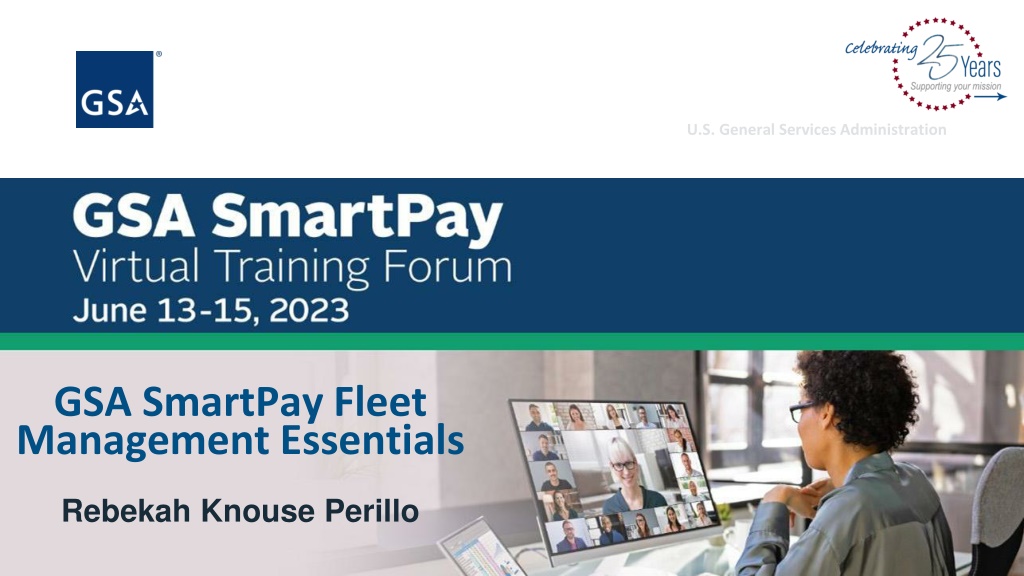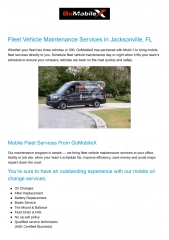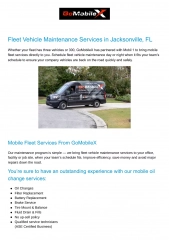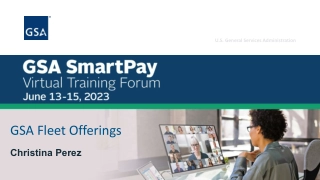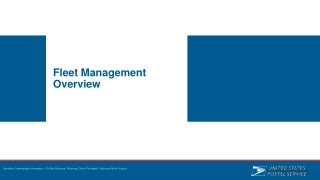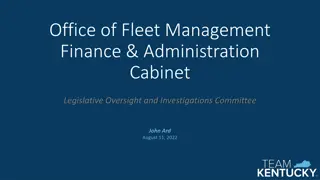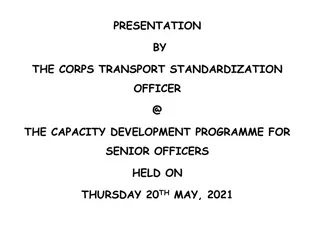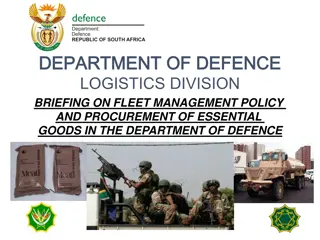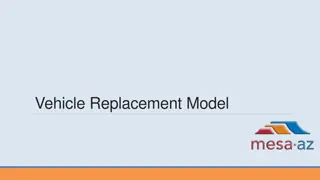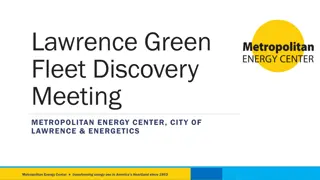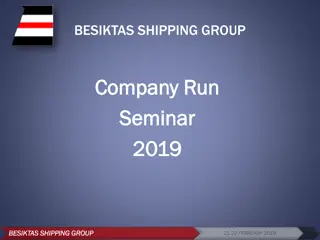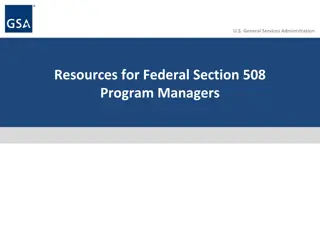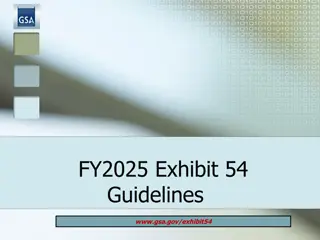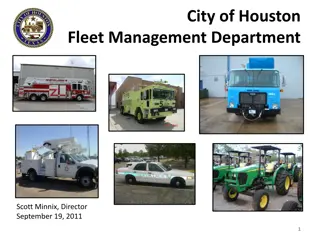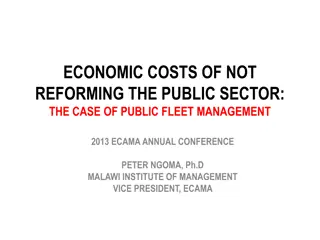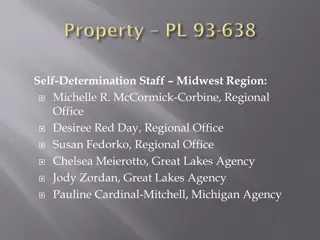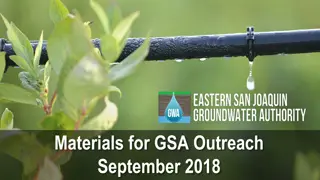Overview of GSA SmartPay Fleet Management Essentials
The GSA SmartPay program enables over 560 federal government agencies to access charge card products and services through a master contract. Agencies can issue task orders with no direct fees, potentially earning refunds. The program includes fleet card services with fixed pricing and options extending up to 13 years. In FY22, the program saw significant spend and transaction growth, particularly in fleet-related expenditures. Opportunities for improvement exist in maximizing refunds based on agency spend.
Download Presentation

Please find below an Image/Link to download the presentation.
The content on the website is provided AS IS for your information and personal use only. It may not be sold, licensed, or shared on other websites without obtaining consent from the author. Download presentation by click this link. If you encounter any issues during the download, it is possible that the publisher has removed the file from their server.
E N D
Presentation Transcript
U.S. General Services Administration GSA SmartPay Fleet Management Essentials Rebekah Knouse Perillo
GSA SmartPay Program Overview More than 560 Federal government agencies/ organizations can access charge card products and services through the GSA SmartPay 3 Master Contract. Over 6.5 million accounts. GSA SmartPay Master Contract awarded in 1998.
GSA SmartPay Program Overview Federal government agencies/organizations issue task orders against the GSA SmartPay 3 Master Contract for charge card products and services from one of two contractor banks: Citibank and U.S. Bank. Agencies/organizations pay no direct fees for using the GSA SmartPay Program. Agencies/organizations have the opportunity to earn refunds.
GSA SmartPay Master Contract Fixed price, IDIQ contract. Maximum base period for the initial order is 4 years with three 3 year options (13 years). The 4-year base period ended on November 29, 2022. Agency awarded a task order to a GSA SmartPay contractor bank and to a fleet card issuer/brand. Download a copy at smartpay.gsa.gov. We are here! 2018 2022 (4-year base period) 2022 2025 (3-year option) 2025 2028 (3-year option) 2028 2031 (3-year option)
FY22 Program Statistics Spend Summary Total Spend: $32.8B 12.4% vs. FY21. Total Transactions: 78.5M 12.9% vs. FY21. Total Refunds: $426.5M 9.4% vs. FY21. Total Accounts: 6.56M 8.5% vs. FY21. Accounts Transactions
FY22 Fleet Spend Fleet spend total $2.2B, 7% of total program spend ($32.8B). Fleet FY21 $1.7B FY22 $2.2B % Change 33.3% Spend Transactions 28.8M 29.7M 3.1% Accounts 813K 780K - 4.1% FY 22 Spend $1.06B % of Fleet Spend 48.0% Agency 1 U.S. Postal Service General Services Administration Department of Agriculture Department of Homeland Security Department of Interior 2 $664M 30.2% $2.2 Billion Fleet Spend 3 $121M 5.5% 4 $118M 5.4% 5 $85M 3.9%
FY22 Fleet Refunds Opportunity to Improve % of Fleet Refunds Agency $ (M) Keep in mind: Higher spend, more refunds. 1 United States Postal Service $24.9M 53.9% 2 General Services Administration $12.9M 27.8% 3 Department of Agriculture $2.5M 5.3% Department of Homeland Security 4 $1.9M 4.1% 5 Department of Defense $1.5M 3.1%
GSA SmartPay Key Participants Account Holder Brands Center for Charge Card Management Agencies/ Organizations OMB Inspector General Banks 11 11
A/OPC Roles and Responsibilities Focal point for answering charge card program related questions. Setting up, maintaining, renewing, and terminating accounts. Serving as a liaison between account holders and the contractor bank. Providing ongoing advice and assistance to account holders. 12 12
A/OPC Roles and Responsibilities Developing agency policies and procedures, as needed. Auditing accounts as required by your agency policy. Using the bank's Electronic Access System (EAS) to perform account management and oversight. 13 13
Renewing Fleet Accounts At least 180 calendar days prior to the expiration of each account, the contractor bank will submit a report to the A/OPC listing each expiring account. Fleet accounts used within the past 90 calendar days will automatically renew.
Renewing Fleet Accounts If the fleet account has not been used within the past 90 calendar days, the contractor bank shall close the account. Renewed cards will be sent between 20-40 days before the expiration date.
Suspending/Canceling Accounts Number Calendar Days Account Status/Action 46 days from the billing date Pre-Suspension Suspension/ Pre-Cancellation 61 days from the billing date 126 days from the billing date Cancellation 180 days from the billing date Charge Off/Write Off 16 16
Closing/Terminating Accounts Immediately notify the contractor bank. Follow the account close out procedures from your contractor bank. Instruct the account holder to destroy/dispose of the card. Review the master file/account holder listing to ensure the account is closed. 17 17
Lost or Stolen Account Instruct account holders to report a lost/stolen fleet account to: Contractor bank. A/OPC. Supervisor. 18 18
Account Holder Roles and Responsibilities Securing the account. Maintaining records. Using the account ethically and appropriately. Understanding agency policy. Reporting a lost or stolen account. Monitoring expenses. Disputing transactions. 19 19
AO Roles and Responsibilities Ensuring account is used properly. Authorizing account holder purchases. Ensuring that the statements are reconciled and submitted to the Designated Billing Office (DBO). 20 20
DBO Roles and Responsibilities Reconciling invoices. Providing timely payment to the contractor bank. 21 21
TDO Roles and Responsibilities Assisting the agency/organization and the contractor bank in tracking and resolving disputed transactions. 22 22
Banks and Brands GSA SmartPay Account Service Providers Citibank U.S. Bank Mastercard Visa WEX (Fleet) Mastercard Visa Voyager (Fleet) 23 23
Bank Roles and Responsibilities Paying merchants for account transactions. Establishing and issuing accounts. Creating and maintaining an Electronic Access System (EAS) for agencies/organizations to utilize in managing the program. Preparing monthly statements for each account holder. Issuing invoices to the DBO for Centrally Billed Accounts (CBAs). 24 24
Bank Roles and Responsibilities Providing customer service 24/7. Preparing reports. Participating in an annual training forum, sponsored by GSA, that provides hands-on training on the EAS, sharing best practices, and addressing any issues and concerns. Complying with all other terms and conditions of the GSA SmartPay Master Contract. Examples include Citibank and U.S. Bank. 25 25
Brand Roles and Responsibilities Dictate where payments can be processed. Facilitate the payment process between account holders, merchants, and issuing financial institutions. Examples include Voyager and WEX. 26 26
GSA Roles and Responsibilities Center for Charge Card Management (CCCM) Provides overall program management and advocacy. Staff gsa_smartpay@gsa.gov for agency and account holder questions. GSA Contracting Officer Make any changes to any of the requirements of the GSA SmartPay Master Contract. Legally commit or obligate the Government to the expenditure of public funds for the GSA SmartPay Master Contract. Render a final decision on a dispute pertaining to the GSA SmartPay Master Contract. 27 27
Other Involved Parties Inspector General Many agencies/organizations will have periodic audits of the your charge card program, and you will likely be a key player in those audits. Office of Management and Budget (OMB) Oversight of government-wide charge card program. 28 28
GSA SmartPay Fleet Business Line
GSA SmartPay Fleet Program Most Fleet accounts are assigned to a vehicle, not to an individual. Fleet accounts are Centrally Billed Accounts (CBAs) and paid directly by the government to the bank. Fleet accounts should be tax exempt.
Fuel, Maintenance, and Repairs The governmentwide fleet account is authorized for the purchase of fuel, maintenance and repair of government owned/operated motor vehicles, aircraft, boats, and motorized equipment.
Fuel, Maintenance, and Repairs Drivers typically can use the fleet card for fuel and for maintenance under $100 without needing approval. For maintenance over $100 or for any accident damage, merchants typically must call for authorization before performing work on the vehicle and running the charge card.
GSA Fleet Card Customers Tax exempt remind vendors. Enter correct odometer readings. One card per vehicle. One driver ID per card. Service for fueling issues and repairs under $100. GSA MCC/AMC for repairs or accident approvals over $100.
Fleet Account Approved Purchases Authorized Purchases Unauthorized Purchases Use fleet charge card matching the license plate of the vehicle you are driving. Using the wrong fleet card for a vehicle. Regular unleaded, self service fuel for vehicle (or alternative fuels, as required). Premium or full service fueling (unless required by state law). Immediately consumable items for vehicle (e.g. quart of oil, washer fluid, wipers). Convenience store items like maps, air fresheners, food, lottery tickets, alcohol, etc. Exterior car washes within local guidance. Over-maintenance of vehicle or excessive car washes or details. Mechanical repairs for vehicle to which card is assigned. Purchases at part stores, upgrading tires, accessories such as snow plows without prior approval from Fleet Service Representative. Charging services for electric vehicles at commercial charging facilities.
CHARGE Act Public Law 116-160 or the CHARGE Act . Required GSA to issue guidance on the use of charge cards to pay for EV charging. Smart Bulletin 036.
EV Charging Stations Use of GSA SmartPay charge cards for both per transaction and subscriptions for EV charging is permissible. Type of card to be used must comply with agency policy.
EV Charging Stations GSA SmartPay contractor bank charge cards (including WEX and Voyager fleet cards) can be used to pay at some charging stations. Be aware that some charging station networks only accept Visa or Mastercard branded cards. Certain charging stations have card readers for walk- up payments, while others do not. RFID cards/key fobs may be used for payment.
EV Charging Stations CCCM and the GSA SmartPay banks will continue to pursue relationships with charging station providers to increase access and acceptance at more charging networks.
Tolls on TDY - TypicallyTravel Card Agencies mostly utilize the GSA SmartPay Travel Card for the payment of tolls while on TDY. However, agency policy dictates which type of card will be used.
Toll Passes - It Depends! Agency policy dictates if purchase, fleet, integrated, or travel cards can be to secure toll pass accounts.
Parking/Parking Passes - It Depends! Agency policy dictates if purchase, fleet, integrated, or travel cards can be used for parking and parking passes.
Section 889 Compliance GSA FMR Bulletin B-53. Agencies should establish their own policies addressing fleet card compliance with Section 889. Agencies do not need to include provisions to obtain a representation from seller when using the fleet card for micro-purchases. Provides guidance for fleet cards used for agency- owned and commercially-leased vehicles. Fleet cards assigned to GSA Fleet fall under policy issued by GSA. 42 42
New 889 Search Tool Protect your agency by checking the prohibited vendor list before making any telecommunications purchases. Easy to use search tool. Search by vendor name, website, CAGE code or UEI code. Provides PDF if registered in SAM.gov. Visit www.smartpay.gsa.gov. Check out Smart Bulletin 33. 43 43
Misuse/Abuse Common examples: Purchases exceed the authorized limit. Purchases for which no funding is available. Using the fleet account for an unauthorized vehicle. Split Transactions. Products or services that do not meet the government's requirements. Purchases for personal consumption. Purchases that are not authorized by the agency/organization.
Fraud Fraud is a deception deliberately practiced with the motive of securing unfair or unlawful gain. 46 46
Fraud Types: Counterfeit Accounts. Lost or Stolen. Non-Receipt. Friends and Family fraud. Phishing. Skimming.
Point of Sale Skimming Skimmer devices usually fit over the original card reader. Some skimmers are inserted in the card reader, placed in the terminal, or situated along exposed cables. Pinhole cameras installed on pumps record a customer entering their PIN. Pinhole camera placement varies widely.
Point of Sale Skimming In some cases, keypad overlays are used instead of pinhole cameras to record PINs. Keypad overlays record a customer s keystrokes. Skimming devices store data to be downloaded or wirelessly transferred later.
Tips at the Gas Pump Inspect the card reader before using it. Pull at the edges of the keypad before entering PIN. Cover the keypad when entering PIN to prevent cameras from recording the entry. Use gas pumps that are in a well-lit location that are by the attendant. Be alert for skimming devices in tourist areas.
